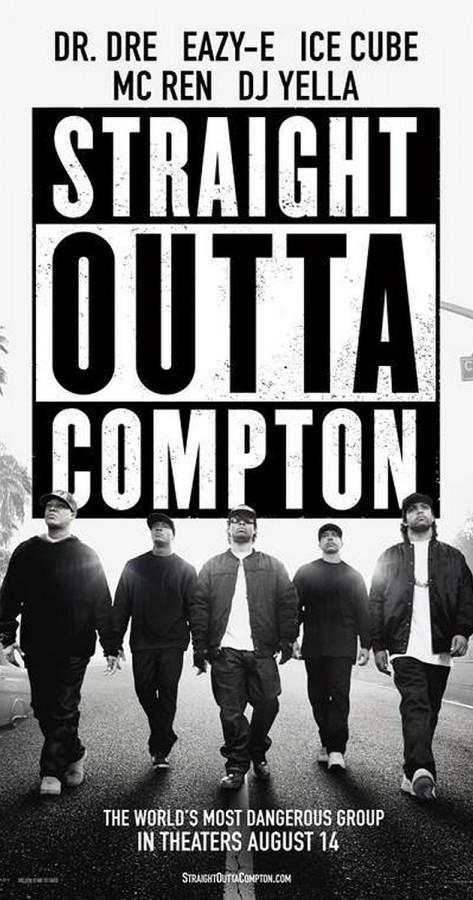Straight Outta Records
September 10, 2015
The world’s most dangerous group now has the world’s most grossing biopic. F. Gary Gary’s box office smash has opened the eyes of a multitude of people, not only in America but around the world. Raking in over $150 million thus far is a record breaking feat for the cast and crew of this film. “Straight Outta Compton” has surpassed Johnny Cash’s “Walk the Line” for the title of the top-grossing biopic of all time. Not only has this movie made fantastic strides in the film industry, it has also made an impact in the hearts of Americans–showcasing a tough and intense time in the streets of our country, paralleling the current events of police shootings and community outrage. Both urban and suburban America was now awakened to the genre of Gangsta Rap.
SWAT is busting down the front door and Eazy-E is fleeing out of the back window. So the tale of NWA begins. This opening scene really sets the precedent for the rest of the film, concerning the group’s rocky relationship with the police (culminating in the song “F*** tha Police”). It also shines a light on the life of Eric Wright before super stardom, starting out as another Compton crack dealer in the 1980’s, cementing the perception of the group’s thuggishness from the opening. Ice Cube’s opening scene, in which his school bus gets pulled over by a group of Bloods, does a great job exemplifying the harshness of where they were coming from and how those struggles turned into masterpieces of music.
One important matter is constantly emphasized throughout the film and couldn’t possibly be more relevant and relatable to today’s America, police brutality. After being continuously harassed by police just because of the color of their skin, the tension, between the group and the police, finally reached a breaking point when coming out of the recording studio, NWA is forced to the ground being accused of drug dealers just for standing on the street. This inspires Ice Cube to come up with the infamous protest rap “F*** Tha Police”, a song that ends up creating a national firestorm and attracting negative attention from the FBI. These scenes had a very powerful effect on me and apparently the LAPD as well. They felt that the film put them at risk because of their extremely unfavorable portrayal, but a deeper reason might be that “Straight Outta Compton” might open old wounds inflicted by the 1992 L.A. riots. Similar to the recent events in Ferguson, MO, the L.A. riots were also caused by an act of police brutality. The riot sequence in the movie evoked all sorts of emotions because the cinematography really transported me into Cube’s low rider cruising down the burning streets.
The film overall was great and should be thrust into the Oscar spotlight as a whole, but the acting by the whole cast was outstanding. To a tee the actors matched the exact same swagger and attitude of the super group. O’Shea Jackson Jr., playing Ice Cube, had a definite advantage but a greater expectation portraying a young and wild version of his father, Ice Cube, who is an executive producer on the movie. From his excellent acting, you would never be able to tell that this was his first role. It was almost eerie to see how all the actors, from minor to starring roles, fit their looks and roles exactly.
Rating this movie on a 10 point scale, I would give it a 9–everything from the acting to the production was more than superb. My only complaint about “Straight Outta Compton” would be that it felt a little too long as the producers could have trimmed a little from it, but for the most part, every scene was enjoyable. With another blockbuster hit, F. Gary Gary was really able to take me through the journey of NWA on the crack-laden streets of Compton.




Samuel Gerstein • Sep 21, 2020 at 1:00 pm
I thought it was gr8!